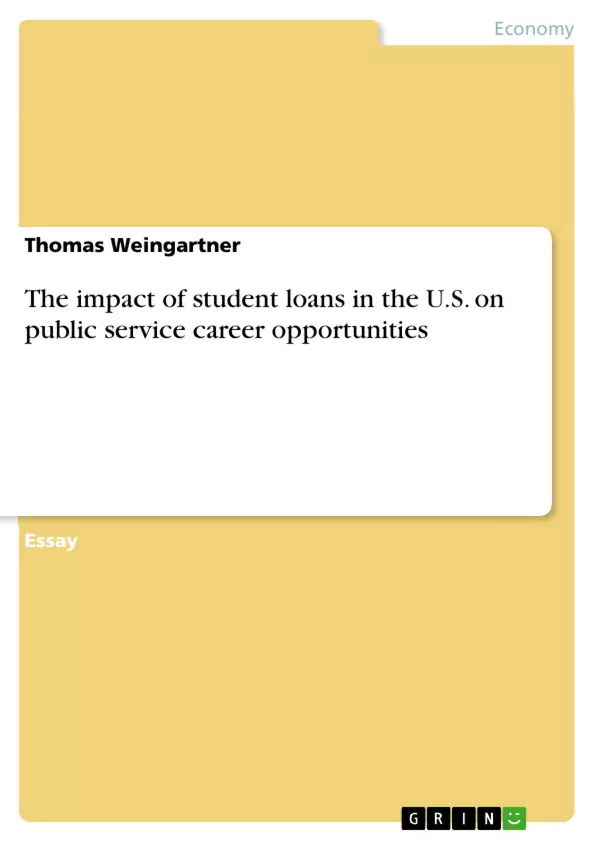At a time when the government estimates that two million new teachers will be needed in the next decade, the large student-loan debt that college graduates face may deter students from entering public-service careers like teaching and social work. More generally, this circumstance will lead to a lack of education and will ultimately create for today’s generation and future generations unsolvable problems. In the media the key phrase “sustainable development” is often used, but nobody connects it to the field of education. This is a sad fact, for education is a fundamental value of every well functioning society, offering not only pure knowledge, but also developing important guidelines and moral norms that enable a human community to survive and to flourish. The US is struggling right now, still facing issues like racism, discrimination and violence that were said to be solved. Consequently minorities unify and segregate themselves into isolation; the gap between rich and poor continues to grow. If the government does not realize that lack of education is the root of ongoing conflicts and sticks on its course underfund education, the gap between wealth and poverty is going to become a crucial obstacle for a modern America that is continuing to claim a hegemony role worldwide.
Inhaltsverzeichnis (Table of Contents)
- The impact of student loans in the U.S. on public service career opportunities
- The need for action
- The value of education
- Obstacles
Zielsetzung und Themenschwerpunkte (Objectives and Key Themes)
This research paper explores the impact of student loan debt on public service career opportunities in the United States. It argues that the high cost of higher education, coupled with rising student loan debt, discourages graduates from pursuing careers in fields like teaching and social work. The paper highlights the importance of accessible and affordable education for societal well-being and sustainable development.- The impact of student loans on career choices
- The importance of education for societal stability and progress
- The need for increased government support for education
- The correlation between education and economic well-being
- The benefits of a well-educated workforce for individuals and society
Zusammenfassung der Kapitel (Chapter Summaries)
The impact of student loans in the U.S. on public service career opportunities
This chapter explores the growing problem of student loan debt in the United States and its effect on career choices. It argues that the significant burden of student loan repayment can deter graduates from pursuing public service careers, which often offer lower starting salaries compared to private sector jobs.The need for action
The author highlights the importance of addressing the issue of student loan debt to ensure a robust and well-educated workforce. It emphasizes the need for increased government support and incentives for individuals to pursue careers in public service.The value of education
This chapter delves into the multifaceted benefits of education for individuals and society. It discusses the correlation between education levels and earnings, civic participation, and overall well-being. The author emphasizes the importance of education in reducing poverty, inequality, and social problems.Obstacles
This section focuses on the challenges faced by students in accessing and affording higher education. The rising cost of tuition and fees, coupled with the increasing burden of student loans, creates obstacles for students from all backgrounds. The author argues for policies that make higher education more accessible and affordable.Schlüsselwörter (Keywords)
This paper focuses on the impact of student loans on public service career opportunities, emphasizing the importance of education for societal well-being and sustainable development. Key themes include access to education, affordability, public service careers, student loan debt, and the role of government in promoting education.Frequently Asked Questions
How do student loans affect career choices in the U.S.?
High student loan debt often deters graduates from entering public service careers like teaching or social work because these roles typically offer lower salaries that make loan repayment difficult.
What is the predicted teacher shortage in the United States?
The government estimates that approximately two million new teachers will be needed in the next decade, a goal threatened by the financial burden of higher education on potential educators.
Why is education linked to "sustainable development" in this paper?
The author argues that education is a fundamental value for a well-functioning society. Lack of affordable education leads to long-term social issues like racism and economic inequality, hindering sustainable progress.
What are the societal consequences of underfunding education?
Underfunding education can lead to a lack of moral norms, increased social isolation of minorities, and a growing gap between the rich and the poor, which creates unsolvable problems for future generations.
What role should the government play according to this research?
The paper suggests that the government needs to increase support for education and provide incentives for public service careers to maintain societal stability and global competitiveness.
- Arbeit zitieren
- Thomas Weingartner (Autor:in), 2006, The impact of student loans in the U.S. on public service career opportunities, München, GRIN Verlag, https://www.grin.com/document/113659



